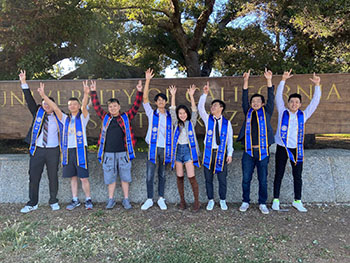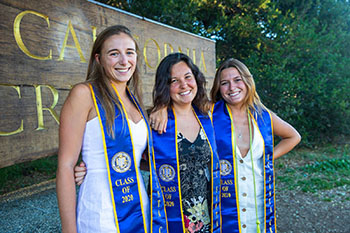Campus News
A commencement like no other at UC Santa Cruz
UC Santa Cruz students, faculty, and staff couldn’t gather in mass on campus for this year’s commencement celebrations. But they still managed to celebrate their achievement and mark the occasion with stirring speeches, activism, and creativity.



For the first time in the campus’s history, UC Santa Cruz’s commencement festivities beamed their way through computer and smartphone screens, instead of taking place in real time on a field, a lawn, or the historic Quarry Amphitheater.
Instead of gathering in boisterous groups on the grass, students tuned in through laptops while sitting in apartments, taking part in dorm-room “watch parties,” or hanging out in their kitchens.
Instead of hugging and kissing their children and foisting balloons and flowers on them, proud parents sent heartfelt video greetings on Instagram.
“’Hey Grant,’ ‘Hey Nick!,’ ‘Hey Marisa!,’ ‘Muchisimas felicidades,’ ‘Hey, congratulations, you made it, kid!,’ ‘You are a shining star that never stops shining!,’’ Hard work pays off.’”
And when that big moment came, and the ceremonies were wrapping up, students had to step outside or risk smacking their graduation caps against the ceiling after hurling them into the air.
Clearly, the threat of COVID-19 created some logistical issues, as well as an unprecedented reliance on technological innovations, making previous organizational questions—is the parking lot far from the ceremony? Did I bring enough sunscreen? Why are all the tent seats gone already?—seem simple and trivial in comparison.
But in spite of the non-analog quality of this year’s Zoomed and YouTubed ceremonies, there were still plenty of moving moments that were bound to get the tear ducts flowing—such as the time when Pablo Reguerin, associate vice chancellor Student Achievement & Equity Innovation, told the students in the Chicanx Latinx Year End Celebration ceremony, “You are your ancestors’ wildest dreams. You will continue their legacy by opening doors and bringing many more with you to this point and beyond.”
Those were the moments that kept the ceremonies real and grounded, even when the well-wishers were far away from one another.
Faculty and students kept repeating a powerful and simple message to the roughly 3,300 undergraduates and 208 graduate students who had applied to graduate this spring: this is a landmark moment in your lifetime. Make sure to stop and take this in, wherever you are. The UC Santa Cruz Econ Grad Video included a brief but heartfelt exhortation from Assistant Economics Professor Brenda Samaniego De La Parra:
“This is a fantastic accomplishment. You should be extremely proud of yourselves. I hope you realize that, and I hope to hear about all the great things you will accomplish in the future.”
“Stay motivated!” said Economics Professor Justin Marion, all decked out in red robes and a black cap. “Stay positive!”
Making the most of it
Besides, UC Santa Cruz has a long history of making the most out of unusual and adverse circumstances and improvising solutions on the spot; this, after all, is the same campus that once housed its student population in trailers on fields full of rocks and dirt piles, and held some of its classes in the East Field House in 1965.
And the UC Santa Cruz community did much more than just adapt to this time of necessary caution. They also made the very best of it, using online platforms to convey the same warmth, intimacy, creativity, and activist spirit that characterizes analog commencement ceremonies every year, while making room for a touch of Sammy the Slug–style gleeful eccentricity.
A short video introducing the Cowell College ceremony showed graduates dancing with their dogs, as well as a scene in which a student discovers a rolled-up college diploma hiding in a shrub underneath a presidential campaign sign reading, “Any functioning adult, 2020.”
Celebrants conveyed their pride and a strong sense of place. Students in various colleges filmed each other dancing in clouds of confetti and waggling hand-made signs, while Oakes commencement students extended greetings and warm congratulations to the graduates in English, Tagalog, Spanish, Mandarin, Cantonese, Amharic, Urdu, Vietnamese, and Hindi.
Oakes College Provost and Associate Professor of Feminist Studies Marcia Ochoa urged graduates to picture the places they missed, and take in the pride and love of their families and friends, even if those people were far away.
“Now the Quarry is quiet and the (Oakes) lower lawn is empty,” Ochoa said. “This morning, two coyotes were just hanging out. The field is closed now, so all I can do is look out across it and remember the joy of a sunny day in June, with sweeping views of the Monterey Bay.”
Ochoa urged viewers to picture “family, little siblings, aunties, grandmas, and decorated mortarboards held down with hot glue and bobby pins, at impossible angles. I want you to close your eyes and imagine the look of pride on your favorite instructor or staff member seeing you in your robes. Imagine them on that sunny day all around you. Even though you have been deprived of that moment right now, we at Oakes want you to know that we see you shining in that sunlight.”
Raising their voices for change
The ceremonies also took place in front of a backdrop of dissent, with protests that have swelled across America after the brutal killing of George Floyd, a 46-year-old African American man, while in police custody in Minneapolis in May.
As part of the 45th annual Black Grad Ceremony, keynote speaker Moses Massenburg (College Ten ’11, sociology), a doctoral student at the Department of History at Michigan State University, delivered his message from his family home in Watts. Though he mentioned the almost constant presence of helicopters and police sirens in his neighborhood, as well as airplane traffic in and out of Los Angeles International Airport, “The noise pollution around me is nothing compared to the noise pollution we are currently enduring as black people.
“In ghettos across America, black people are struggling for survival now,” he said. “(But) we have assets, you and I. We graduated from UC Santa Cruz. We are alumni now. And there’s power in that … All you beautiful, powerful students have joined the ranks of the great alumni who are making this world a better place.”
He read a list of African American alumni names including Abraham Jones (College Ten ’12, community studies), now a Ph.D. candidate at the University of Colorado, and the high-profile activist Tiffany Loftin (Oakes ’11, political science), who then–President Barack Obama appointed in 2015 to the President’s Advisory Commission on Educational Excellence for African Americans, which focuses on improving student achievement.
Devin Virassammy (Oakes ’20, engineering) addressed nationwide protests in his student keynote remarks for the Jack Baskin School of Engineering’s commencement ceremony.
“The fault lines and divisions in our country grew sharper and deeper,” said Virassammy. “As the son of immigrants … I often wonder, when I am stopped by an officer, if all the plans I have made beyond college would instead be replaced by my name as a hashtag on Twitter.”
Virassammy ended on a message of urgent change. He urged the newly minted alumni to raise their voices and speak out against injustice.
“We need your voices,” he said. “With our generation lies the challenge and the chance to advance the cause for equality, justice, and the right to breath. The greatest challenge of the century is not only to eradicate COVID-19, get back to the moon, or fix the damaged climate, but how we involve our society’s underfunded, underrepresented, and forgotten peoples. With us lies the opportunity to create the world we want to live in.”
As a student researcher in the lab of assistant professor of biomolecular engineering Daniel Kim, Virassammy studied how to determine whether cancer patients were suitable for anti-cancer treatment. After graduation, he plans to start a company with a group of undergraduates who are currently working with the U.S. Department of Agriculture to convert plastic waste into energy sources.
Transforming lives and sharing stories
Award-winning novelist and memoirist Reyna Grande (Kresge ’99, creative writing, film and video), author of The Distance Between Us and A Dream Called Home, urged Kresge graduates to “cling to your dreams and don’t let go.”
“To receive my university diploma was one of the proudest days of my life,” said Grande, who comes from the state of Guerrero, the second-poorest state in Mexico. “When we immigrated to the United States, my father was determined that his children get an education. He demanded perfect grades and attendance from us. One of the things I loved about my father was, he was a big dreamer. His dream became my dreams.”
At UC Santa Cruz, Grande started out feeling scared and isolated, with times of doubt. But she had a strong drive to write stories celebrating her culture. She longed to use her creativity and talent to transform herself and her world.
“You can do this, too, by staying focused,’’ she said. “Don’t let anybody take your dreams away from you.”